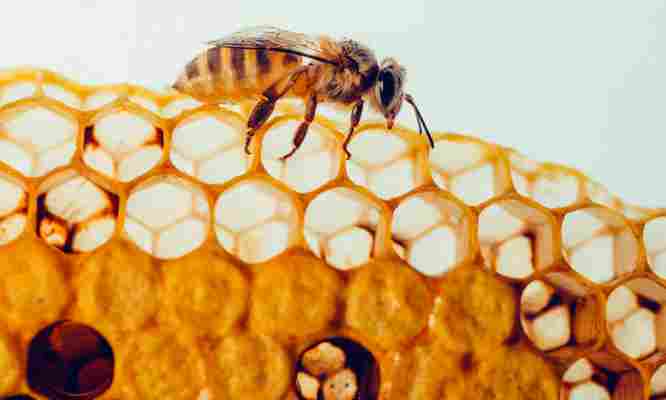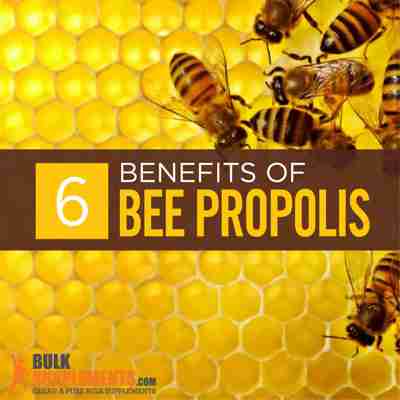Propolis benefits: what is propolis and how to make propolis tincture?
What Is Bee Propolis & How Does It Benefit Sensitive Skin?
Bee propolis is what is created when bees harvest a tree's immunity-boosting secretions like sap and resin, adding enzymes through their body processes, as well as plain beeswax, to produce an end product that's antiviral, antibacterial, antifungal, anti-inflammatory, and an antioxidant.

"To truly understand what a powerful compound propolis is, you have to look at the plant world. Propolis comes from the giants in the plant kingdom: trees. And trees have evolved to live thousands of years, but in order to do this, they have to survive all environmental aggressors: viral, bacterial, pollution, insects, etc. To withstand all of this, trees have created a strong immunity of plant phenol chemicals and bioflavonoids to defend themselves," says Tanya Hawkes, sustainable beekeeper and founder of organic skin care line Therapi Honey Skincare. Hawkes continued to explain that bees mainly line their hives with propolis as an external immune system.
Bee Propolis Benefits, Side Effects, and Dosage
What is Bee Propolis?

Bee propolis, also known as bee glue, is a product bees produce and use to seal cracks in their hives. It consists mostly of resin, wax, essential oils, pollen and other organic compounds (x).
Bee propolis is a type of apitherapy–the use of bee products such as honey, propolis, pollen and venom for therapeutic purposes. Substances made by bees are believed to have unique and potent health benefits.
Not all bee propolis is alike. Because bees pollinate many different types of plants all over the world, factors such as geographic location, season and type of pollen collected by the bees impact the exact composition of the propolis (x).
Propolis boasts numerous potential health benefits. It might help treat gastrointestinal disorders, control viruses, improve dental and skin health and even have a role in cancer prevention.
How else can bee propolis keep you healthy?
Bee Propolis Benefits
Nutrient-Rich
Bee propolis contains plant compounds called flavonoids, which act as potent antioxidant and anti-inflammatory agents. It’s also rich in vitamins B1, B2, B6, C and E, and minerals like magnesium, calcium, potassium, sodium, copper, zinc, manganese and iron (x).
Gastrointestinal Health
Bee propolis could help relieve symptoms associated with gastrointestinal conditions like ulcerative colitis. A chronic inflammatory condition that causes a constant inflammation of the colon, ulcerative colitis can be debilitating. In one study, researchers gave bee propolis to animals and found that it significantly reduced the number of cysts and abscesses in the colon (x, x). Propolis may also soothe and even prevent the formation of stomach ulcers, and act as an antacid (x).
Bee propolis has also shown promise in healing parasitic infections like giardiasis. One of the most common waterborne illnesses in the United States, giardiasis causes an array of uncomfortable and unpleasant GI symptoms. Doctors typically treat it with anti-parasitic drugs, but studies suggest that bee propolis can be an effective alternative therapy. One study showed it to be effective in eradicating the parasite in 52 to 60 percent of subjects versus 40 percent for conventional drugs (x, x).
Supports Dental Health
Bee propolis doesn’t just keep your colon healthy; it also benefits your teeth. Because of its antibacterial properties, it may help reduce plaque and improve mild periodontal problems.
One study of 25 people who rinsed with a mouthwash containing 5 percent bee propolis had a 40 percent reduction in overall plaque and gingival markers after 90 days (x). Similarly, another study showed that a toothpaste made with 3 percent propolis improved the oral health of 32 men (x).
Bee propolis can also improve a painful, debilitating oral side effect of chemotherapy called oral mucositis (x). Oral mucositis can lead to nutritional problems, an inability to eat and increased risk of infection due to open sores in the mucosa (x).
Antiviral
Because bee propolis exhibits antiviral activity, it may help suppress oral and genital herpes (x, x)
An in-vitro study found that within 24-48 hours, bee propolis significantly decreased the replication rate of the herpes virus. The researchers suggest that bee propolis may even work better than the anti-herpes drug acyclovir. In this study, bee propolis enhanced the effects of acyclovir (x).
Healthy Skin
Bee propolis is a popular ingredient in beauty and cosmetic products. So are the claims that it can improve the appearance of your skin genuine?
In some cases, yes! Research suggests that bee propolis might heal warts when taken orally (x). Studies have also shown that Brazilian propolis extract treats acne and reduces overall bacteria levels on the skin (x).
Bee propolis is also well-known for its ability to heal wounds. Propolis has antibacterial and anti-fungal properties, which can help prevent the skin from forming a “biofilm” (a thin layer of bacteria). It also promotes collagen production at the wound site, which speeds up healing. Bee propolis is a particularly effective treatment in cases of minor burn wounds (x).
Anti-Cancer
Researchers are taking a close look at how bee propolis can help prevent and treat certain cancers. While studies are ongoing, bee propolis appears to possess several anti-tumor compounds. Besides stopping the growth of cancer cells, propolis also seems to contribute to aptosis (death) of cancer cells (x).
Additional in-vitro studies have shown that bee propolis can stop the growth of cancer cells in the breast, kidney and colon (x, x, x).
History of Bee Propolis
The ancient Greeks, Romans and Egyptians used bee propolis extensively. They knew it was a powerful remedy for many ailments but didn’t have the scientific means to understand exactly why.
Its popularity declined in the Middle Ages, but the ad fontes movement (“back to the source”) of the European Renaissance revived it again. Modern research on its chemical composition began after World War II and is still going strong (x).
Bee Propolis Side Effects and Dosage
Bee propolis powderis an easy way to add a boost of healthy nutrients to your diet. Take 1.2 g (scant 1/2 tsp) one to two times daily, or as directed by your physician.
Don’t take bee propolis if you’re allergic to bees or honey, or if you’re nursing or pregnant. Contact dermatitis may occur if you’re sensitive to bee products. However, as long as you stick to the recommended dosage, side effects are rare.
The Bottom Line
Bee products like bee propolis are some of the most biologically dense supplements available. Research is just starting to catch up to what people seem to have known for thousands of years–that propolis supports your immunity, skin, teeth, and overall wellness.
Propolis benefits: what is propolis and how to make propolis tincture?
Propolis benefits: what is propolis and how to make propolis tincture?
Bee propolis has been used in medical practice since ancient times. It is a natural remedy full of antibacterial, anti-fungal and antiviral properties. It carries a wide variety of benefits. What’s more important, is that propolis has an antioxidant effect, so it’s a real enemy of aging!
What is propolis?
Did you know that honey isn’t the only thing that bees make? Bees also produce a compound called propolis from the sap on needle-leaved trees or evergreens. When they combine the sap with their own discharges and beeswax, they create a sticky, greenish-brown product used as a coating to build their hives. This is propolis.
Propolis is a fresh, pleasantly strong-smelling, and biologically active product that can retain its healing properties for up to 10 years. It has a distinctive, bitter, and pungent tasting. Its color ranges from yellowish to dark brown, grey, or sometimes even greenish. The older the propolis, the darker the color. Bees collect propolis from sticky buds, shoots of trees (poplars, pines, birches, etc.). It is also well known as bee glue because bees use it as a building material to glue cracks in the hive, to cap honey, and even use it to embalm perishable foreign bodies that cannot be removed from the hive. Due to the same preservative properties, being an air and moisture-tight product, it prevents the spoilage of other bee products like bee bread, pollen, royal jelly, and raw honey.
Natural bee propolis is solid at room temperature while heated to 30-40°C becomes sticky like glue, and melts only at 80-104°C. It can only lose its natural healing properties when melted. Moreover, it dissolves well in strong alcohol infusing the alcohol with antibacterial, anti-fungal, and healing properties.
Raw propolis as a natural remedy
The spectrum of propolis benefits is impressively wide. It fights fungi, viruses, has anti-inflammatory, bio-active and antioxidant properties. In medieval times it has been well known for its local anesthetic function. The benefits of propolis have been known for a long time. Since ancient times, people knew that propolis eliminates bad breath, reduces or completely suppresses pain or swelling, and helps heal wounds. In folk medicine, it was mainly used as an external medicine. It used to be warmed to softness, spread in a thin layer, and placed on a wart, scab, or wound. It was even used to tackle tuberculosis.
Raw Propolis
In later times people realized that bee glue can be made into propolis tincture by dissolving in strong alcohol. This way people started to treat internal health problems too. The antibacterial properties of propolis extract disinfect internally and start a healing process. Therefore it is very good to treat stomach ulcers, tonsillitis, or dental gums.
How to make propolis tincture yourself?
Propolis tincture can be used to treat fungal skin diseases, abscesses, long-lasting wounds, as well as trophic leg ulcers. While propolis cream can heal eczema, dermatitis, psoriasis, burns, and frostbite. However to make the cream, first, you have to make the extract with strong alcohol. This will make propolis liquid which can later be used on its own or in making various skin creams.
To start you will need:
30g of Raw Propolis 60g of alcohol spirit (70%) 2 empty glass jars (recycle raw honey jars) Cheesecloth
Propolis Tincture
Put all the bits of raw propolis into an empty jar and pour all of the strong alcohol spirits (it would be best to have as strong as 70%). Close the jar and place it in a warm and dark location. Best temperature to keep the mixture would be at around 30°C. We found that a cupboard above the oven or stove is one of the better locations due to the constant heat. The mixture should be kept for 3 weeks. Once in a while shake the jar to stir the contents.
After 3 weeks, place the cheese cloth on the jar opening and pour all the contents into an empty jar. The cheese cloth will filter the mixture and will lead to a clear propolis liquid. You can now can use propolis tincture as an antibacterial, anti-fungal, antiviral and bio-active agent full with antioxidants.

